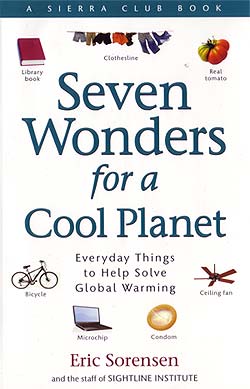 Review:
Review:
This small book feels like it is aimed at those who are already converts to the reality of, not only, global warming, but also of the fact that we need to act, and act now. At the same time, it is sized nicely as a gift from those if us that 'get it', to, perhaps, our more challenged friends.
The Seven Wonders are, as the cover illustration makes clear, the library book; the clothesline; the real tomato; the bicycle; the ceiling fan; the microchip and the condom.
In fact, as you may surmise, a number of these actually stand in for whole categories of easily utilised sustainable tools.
The 'real tomato' is less about tomatoes than it is about local and sustainably produced foodstuff in general, using a juxtaposition between tasteless beef tomato from the supermarket and the flavoursome small crimson taste-bomb that you can grow in your windowbox as a hook to get your interest.
The clothesline stands in for any low energy / low tech alternative to energy intensive equipment found in every home, regardless of true need.
The condom stands in for developing a real awareness of population problems and sustainability - though as a tool it may be unsurpassed: now that no less a personage than the Pope has come out against over-population, perhaps it is also time to more publicly trumpet the virtues of the sheath!
Bicycles are another stand-in for less energy-intensive ways of going about our daily lives, this time the bigger picture being the need for a recalibration of our lifestyle to more local horizons.
The ceiling fan will be an oddity to readers in temperate climes. How is this a good thing? Surely doing without them is better. Who do we know who uses a ceiling fan outside the set of It Ain't 'alf Hot Mum? However, the book is produced by the Sierra Club [http://www.sierraclub.org/] (whose offices are in San Francisco) and the Sightline Institute [http://www.sightline.org] - it is aimed most immediately at an American market (obvious, too, from the US oriented statistics and the pricing of
things in dollars). Thus, the norm they are fighting against is an overweening reliance on energy-intensive air-con - for cooling in summer and heating in winter.
In this environment a ceiling fan is a low energy boon. The writers also take into account modern building techniques, pointing out that even the fan may be otiose in the context of better insulated homes.
The microchip also seems to be an odd one out. And despite their arguments, I remain troubled by it's inclusion. Whilst microchips often aid regulation of equipment that can save energy, in my view the rare metals, the oil dependent industrial processes, the heavy use of solvents in those processes, and the dubious 'necessity' of much of the equipment it helps run more efficiently mitigate against regarding it as a solution rather than a problem. Indeed, promoting an alternative mindset is the subject of much of the rest of the book - cf: the chapters on clotheslines, ceiling fans, bikes, and real tomatoes...
The library book is another interesting wonder. Again, it could stand in for lend-and-hire of other things as well. But, as Michael Moore makes clear in his book Stupid White Men (see chapter 5, Idiot Nation), libraries in America are in trouble. In the UK they also seem bereft of, erm..., books. So promoting them as a good tool against climate change, replacing mass consumption of books for home libraries, is a great idea - the library must be fought for and revived. However, a couple of problems remain - in the short term, whilst libraries are run down, unless you want common denominator bullshit (or a very long and expensive wait) the library is not much use (though frankly the bookshop too is increasingly limited); and also, the internet (and all it's energy use put in the balance against the decrease in goods transported - barring internet placed hard copy orders, of course) has been responsible for a serious reduction in the sales of books as well as of lending.
One might also question the wisdom of publishing a book for mass distribution that advocates lower resource use and the replacement of mass market books with (presumably) lower print-run for-libraries-only titles. Instead, the book could have been a website; or a series in Scientific American, National Geographic or the New York Times. A counter-argument that these ideas are important enough to justify a small format low page count title of this sort would be, one, fair enough, but, two, an opening of the floodgates to "but I can justify mine as an exception too" - who should be the arbiter? Given that books are not generally printed on demand the answer "the market will decide that" won't wash. Those who side with Sierra Club (and, to an extent, I count myself amongst them) might say "let Al Gore decide", but I'd also have to agree with those that felt that to be a repression of the freedom of expression of others (and hasten to add that the book doesn't suggest this anyway - in fact it doesn't seek to justify or explore the possible contradiction between it's own existence and it's espousal of library books as a global warming solution, or even seem to realise the question may be asked).
However, the book does, I think, pretty much succeed in achieving what it sets out to do. It covers a lot more ground than the chapter headings alone might suggest, and does it succinctly and in a readable and interesting style. One minor gripe, linked directly to their success in keeping a low page count, might be that there are too few references to bolster quoted statistics and facts - but there are some notes on sources in the back and also contact details or weblinks, so if you had a burning need to find the source of a particular item you are given some means of finding out.
So, to reiterate my first point, I think that many of the potential readers for this book are already converts to it's position, which may limit it's sales. However, it also makes a great idea as a gift to people you may know that aren't on board with the paradigm shifts that are upon us, but who you believe are open to argument.
Perhaps more to the point, I enjoyed reading it and found it to be a fun presentation of some interesting material.
– Review: Tim Barton



 Review:
Review: